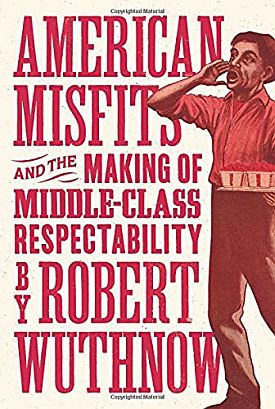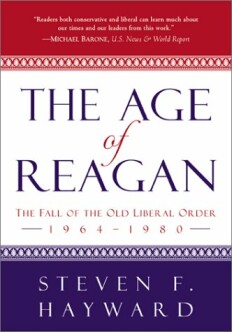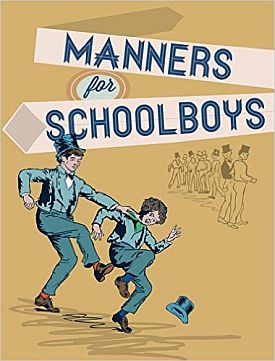Othering Whites
From The Weekly StandardAmerican Misfits and the Making of Middle-Class Respectability
Robert Wuthnow
Princeton University Press, 352 pp, $25.49
Now it can be told: In 1968, I was one of those who got “clean for Gene.” I cut my hair and put on a jacket and tie to campaign for Senator Eugene McCarthy in the Democratic primaries of that year. Those of us who did so understood without having to have the matter explained to us that we were likely to do more harm than good to the McCarthyite and thus the anti-Vietnam war cause if we presented ourselves to people in our natural, hippyish state. It seemed a small sacrifice to make, and the more so when compared with that being made by our coevals in Vietnam, when voters (of which I was not yet one) on the left as well as the right expected politicians and their representatives to present a respectable, middle-class appearance.
Still today, even far-left politicians rarely eschew the coat and tie if they hope to get elected. But many ivory-tower intellectuals now feel free to identify middle-class respectability — as much of behavior as of appearance — as the class enemy. Consider what happened after law professors Amy Wax and Larry Alexander published an article in the Philadelphia Inquirer last August arguing that many of the ills of modern society are connected to a breakdown of mid-20th- century “bourgeois norms,” which “laid out the script we were all supposed to follow”:
Get married before you have children and strive to stay married for their sake. Get the education you need for gainful employment, work hard, and avoid idleness. Go the extra mile for your employer or client. Be a patriot, ready to serve the country. Be neighborly, civic-minded, and charitable. Avoid coarse language in public. Be respectful of authority. Eschew substance abuse and crime.
The academic community’s cries of outrage could be heard from the University of Pennsylvania, where Wax teaches, to the University of San Diego, where Alexander does. Several of their protesting colleagues suggested that endorsing the “bourgeois” values Wax and Alexander listed is tantamount to white supremacism.
Put into plain English, the idea sounds preposterous, which is why it rarely is put into plain English and instead is couched in academic jargon. One example, borrowed from “post-colonial studies,” has to do with what is called “othering” as a technique of oppression—originally of subject peoples by colonial powers. Robert Wuthnow, in his new book American Misfits and the Making of Middle-Class Respectability, uses the term to describe the middle-class social and economic hegemony over such marginal figures as hucksters and peddlers, lunatics, religious zealots, immigrants, and naughty children. In the 18th and 19th centuries, Wuthnow writes, they were treated by the bourgeois culture as “liminal” groups on the disputed borderlands of the rising middle class.
For most of its length, Wuthnow’s book avoids making overtly political points and merely tells stories about the fringe categories, devoting a chapter to each. In addition, there is a chapter on the rich, because, particularly during the Progressive era, they were also regarded with suspicion as being “other” than the newly identified “common people” of the middle class, among whom the sort of norms now so disapproved of by the academic left were thought particularly to reside. “The wealthy may have been admired,” he writes, “but newspapers, sermons, and fiction castigated them as cold, heartless persons who ran soulless corporations and pursued superficial pleasures.”
Among those who use the word “othering” unselfconsciously and without quotation marks, this view of it is not a common one. In fact, Wuthnow himself hardly uses it until his final chapter, to which he gives that title. The chapter will be heavy going for anyone not used to the quasi-Marxist vocabulary of ideological progressivism. But it is less than nine pages long and worth making the effort to get through because, although it is not overtly so, it amounts to a critique of the sort of race-based ideological social science favored by the critics of Wax and Alexander. Race and 19th-century notions of white supremacy are mentioned along the way, but they have little or nothing to do with the sorts of discrimination Wuthnow’s book primarily deals with.
Wuthnow even dares to question the now-commonplace equation of “othering” with “whiteness”—which he writes is “an empty cultural category that masks the diversity it contains.”
The usefulness of “whiteness,” however, from a propagandist’s point of view, is that a skilled manipulator of the jargon can purport to demonstrate that Donald Trump—or, indeed, anyone else—is a white supremacist merely by being (a) white (though even this requirement may be waived for those who only “act white”) and (b) in favor of one or more of the things that the mostly white middle classes used to be in favor of, irrespective of one’s actual views on race. Wuthnow, by de-demonizing the middle class without ignoring its actual tendency to exclude the morally (or mannerly) marginal, gains some credibility on behalf of progressive social science, making it at least potentially something more than a hunt for new classes of victims of “bourgeois culture” (or “whiteness” or “imperialism” or “capitalism” or what have you).
Wuthnow’s argument about the marginal communities calls the whole idea of “othering” into, well, if not doubt then banality. For doesn’t the social marginalization of certain groups, including the greedy, corrupt, and pleasure-seeking rich, merely show that it is inherent in the very idea of morality that it will somehow exclude those who do not behave according to its strictures? And aren’t the academics who are protesting against even a sympathetic account of bourgeois values every bit as much in the exclusion business as those they so disapprove of?
In other words, Wuthnow’s book, though it is full of interesting facts about the historical mechanisms of discrimination, conceptually hovers on the edge of tautology. An exclusive system excludes people; a tried-and-true method for some people to “get ahead” (as it used to be called) is always going to involve some other people being gotten ahead of. Making such heavy weather out of such an obvious fact typically arises out of the same political impulse given expression by the critics of Amy Wax and Larry Alexander, critics who take it for granted that inequality is malum in se and that true morality requires that there shall be no getting ahead so that there can be no falling behind.
Wuthnow’s book would also have benefited from a bit more in the way of contextualization for its narrowly American focus, especially in the chapter on naughty children. The novels and stories and chapbooks and cautionary tales meant to propagandize for middle-class ideas of good behavior had their counterparts in most if not all Western countries. Many, like Heinrich Hoffmann’s Der Struwwelpeter, were even more sternly moralistic than any of the American or English examples Wuthnow cites. Likewise, his mention that, to the American middle classes, “fanatics were like people in less civilized parts of the world who believed in magic” suggests a comparison to the self-described “civilizing mission” of the European colonial powers, but this is not followed up—perhaps because it would be one invitation too many to intervention by the p.c. police.
But Wuthnow deserves commendation for thinking more creatively about discrimination and its ideological twin, “othering,” than many of his colleagues in the social sciences, and in the process making a real contribution to social history as it used to be understood, before it got so politicized. He has even provided an amusing precedent for the middle-class respectability, or the remains of it, that I was trying to propitiate in 1968. It turns out that in 1820, a widely circulated account about a group of religious fanatics called the Pilgrims in central Pennsylvania (where I was being clean for Gene almost a century and a half later) described them as marked by their deviation “from generally accepted expectations about dress, cleanliness, posture, and language.” The group lived communally, and their “quarters were strewn with dirty blankets, the people wore rotten garments, and their hair was matted.” Useful to know that the hippies were around even way back then—before being whipped back into line, no doubt, by a more energetic sort of middle-class respectability than anything now surviving.
James Bowman, resident scholar at the Ethics and Public Policy Center, is the author of Honor: A History.
Discover more from James Bowman
Subscribe to get the latest posts to your email.







